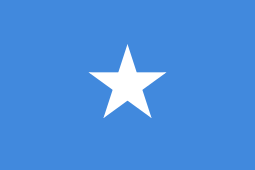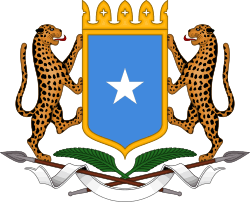Transitional national government, Republic of Somalia
The Transitional National Government (TNG) was the internationally recognized central government of Somalia from 2000 to 2004.
Transitional National Government of the Republic of Somalia | |||||||||
|---|---|---|---|---|---|---|---|---|---|
| 2000–2004 | |||||||||
 Flag
| |||||||||
.svg.png) | |||||||||
| Capital | Mogadishu | ||||||||
| Common languages | Somali · Arabic | ||||||||
| Religion | Islam | ||||||||
| Government | Provisional government | ||||||||
| President | |||||||||
| History | |||||||||
• Somalia National Peace Conference | May 2000 | ||||||||
• Transitional charter | 6 April 2004 | ||||||||
| ISO 3166 code | SO | ||||||||
| |||||||||
 |
|---|
| This article is part of a series on the politics and government of Somalia |
|
Constitution |
|
|
Judiciary |
|
|
|
|
|
Overview
The TNG was established in April–May 2000 at the Somalia National Peace Conference held in Arta, Djibouti. It was militarily and politically opposed by the Somalia Reconciliation and Restoration Council, which was formed by faction leaders including Hussein Mohamed Farrah Aidid and Mohamed Dhere.[1]
In principle, the Transitional National Charter, which gave rise to the TNG, recognized de facto regional autonomy and the existence of new entities in the north of the former Somalia, home to relatively homogenous clans. In some parts of Somalia, however, decentralization meant state authority disintegrated.[2]
According to Le Sage, the TNG in 2002 had all of the organs of a national government, including executive and judicial structures as well as a parliament, a police force and standing army. However, its institutions remained very weak on account of a dearth of basic office equipment, lack of territorial control, and inability to raise tax revenue. Due to these limitations, the TNG was unable to provide basic social services. Ministers and legislators also often expressed frustration at being shut out of the real decision-making process, and of often receiving irregular and limited salaries. As such, Le Sage argues that the public officials served more as symbols of the potential for a broad-based, national government.[3]
The TNG's internal problems led to the replacement of the prime minister four times in three years, and the administrative body's reported bankruptcy in December 2003. Its mandate ended at the same time.[4]
On October 10, 2004, legislators elected Abdullahi Yusuf Ahmed as the first president of the transitional federal government (TFG), the TNG's successor.[5] He received 189 votes from the TFG Parliament, while the closest contender, erstwhile Somali ambassador to Washington Abdullahi Ahmed Addou, got 79 votes in the third round of voting. The then incumbent President of Somalia, TNG leader Abdiqasim Salad Hassan, peacefully withdrew his candidature.[6][7]
History
2000
- Somalia National Peace Conference (SNPC) or Djibouti Conference, held in Arta, Djibouti, on April 20 - May 5, 2000.[8] The name Transitional National Government (TNG) was selected for the initiative at this time.
- Election of Abdiqasim Salad Hassan as President by clan representatives
2001
- National Commission for Reconciliation and Property Settlement
2002
- 2002 Somali Reconciliation Conference held in Eldoret, Kenya[9]
- Appointment of General Ismail Qasim Naji as the leader of the army in January 2002.[10][11] The army in March 2002 numbered 2,010 men and 90 women.[12]
Mutinies in early 2002.[13]
Leaders and members
- Abdiqasim Salad Hassan – President
- Gen. Ismail Qasim Naji – Army commander (Somali Armed Forces)
- Ali Khalif Galaydh – 1st Prime Minister, October 8, 2000 – October 28, 2001
- Osman Jama Ali – 2nd Prime Minister, briefly held post October 28–November 12, 2002[4]
- Hassan Abshir Farah – 3rd Prime Minister, 12 November 2002–December 8, 2003
- Mohamed Abdi Yusuf – 4th Prime Minister, December 31, 2003 – November 3, 2004[4]
- Ali Mahdi Muhammad – MP in the TNG
- Rasack Yousuf – MP in the TNG
- Abdirahman Omar – MP in the TNG
- Mahamed Saeed – MP in the TNG
References
- Central Intelligence Agency (2014). "Somalia". The World Factbook. Langley, Virginia: Central Intelligence Agency. Retrieved April 8, 2014.
- Women and Gender Equality in Peace Processes: From Women at the Negotiating Table to Postwar Structural Reforms in Guatemala and Somalia, Sumie Nakaya, Global Governance Vol. 9, No. 4 (Oct.–Dec. 2003), pp. 459-476
- Somalia: Sovereign Disguise for a Mogadishu Mafia, Andre Le Sage,Review of African Political Economy, Vol. 29, No. 91, (Mar., 2002), pp. 132-138
- "TNG Prime Minister Concludes Formation of Cabinet". 2003-12-31. Archived from the original on September 21, 2004. Retrieved 2014-04-08.CS1 maint: unfit url (link)
- Somali PM optimistic about rebuilding country
- Somalia MPs elect new president
- Rulers - Somalia - October 2004
- Somalia National Peace Conference Program, hosted at Banadir.com
- SOMALIA: Interview with Barre Adan Shire, chairman of the Juba Valley Alliance (JVA) IRIN
- "The Lives of 18 American Soldiers Are Not Better Than Thousands of Somali Lives They Killed, Somalia's TNG Prime Minister Col. Hassan Abshir Farah says". Somalia Watch. 2002-01-22. Archived from the original on 2007-01-03. Retrieved 2007-01-17.
- "Somalia: Warlords lay down weapons". SomaliNet. 2007-01-17. Archived from the original on 2008-10-14. Retrieved 2007-01-17.
- "War Clouds Over Somalia". Middle East Report. 2002-03-22. Retrieved 2007-01-17.
- Somalia: Countering Terrorism in a Failed State, ICG Africa Report N°45, 23 May 2002, p.6